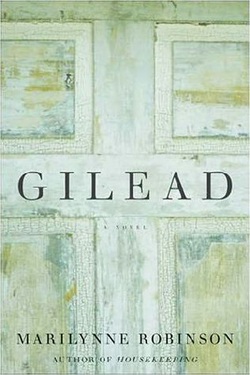* spoiler alert * this book review tells all *

Jesus was not an intellectual. The narrator of Marilynne Robinson’s Gilead, the Reverend John Ames, is. His discourses on things Christian explore the subtleties of grace and love and God’s light, but he himself cannot act to save his godson, the lying, selfish, devious, no-account son of Ames’ best friend the Reverend Boughton. When the prodigal son Jack Boughton returns home to Gilead, Iowa, he receives precisely no help in his attempt at starting a new life. He receives a cold reception, a pointedly critical sermon, unflinching attention to long-held gospel principles and, in the end, one blessing.
I would not call this Christian behavior.
For the first illegitimate child Jack Boughton abandoned, early in his life, the Reverends Ames and Boughton expended great efforts to assist the mother and child. But for the second illegitimate child, which Jack fathered in mid-life with his black common-law wife—a woman and child he loves and longs to support and live with—nothing. His elderly father cannot be told about the mixed-race couple for fear the news will kill him. He is dying, and in the year 1956 miscegenation is a scandalous thing. The Reverend Ames, also in failing health, does nothing with the knowledge but assess and bury it.
The tastiest bits of the novel involve Ames’ grandfather, an abolitionist preacher who harbored John Brown in his Kansas church and used his ministry to end slavery and save the United States’ soul, violently. Whereas our Reverend Ames refuses to forgive Jack Boughton for abandoning his first child, for squandering fatherhood “as if it were nothing,” and cannot be stirred to assist the older, humbler Jack whose mixed-race family needs a decent place to spend their days together. Jack comes to lay his burden down—could he and his wife and child find a place to live in Gilead? To me that is the central question of this book. But Robinson’s Gilead is a “hill of testimony,” pages and pages of delicate reflection on a spiritual life, so there is no place for Jack.
Jesus spent his ministry with sinners, prostitutes, the poor, the weary and outcasts. John Ames does not even feel the lack of Christlike care offered to Jack Boughton. He uses Jack as a tool for self-examination, a theological sticking point. The only warmly compassionate person portrayed in this novel is Ames’ uneducated wife Lila, who says, “A person can change. Everything can change.”
If religion is not effective in relieving suffering and opening closed doors into grace, why is it worth our attention? For all Ames’ artistry of thought and expression, I would rather have read the life of Ames’ wife. Or his driven grandfather. I’m with the Bible on this one: To him who asks, give.
P.S.
Poking around in the history and life of John Brown, I found he created an anti-slavery group called The League of Gileadites. I doubt this is an accidental link. Brown said at the founding of the League, “Nothing so charmes the American people as personal bravery.” Wikipedia explains that “In the Bible, Mount Gilead was the place where only the bravest of Israelites would gather together to face an invading enemy.” Robinson’s town of Gilead, like the aging failing Ames, is the opposite of this. I hope she intended the irony.
I would not call this Christian behavior.
For the first illegitimate child Jack Boughton abandoned, early in his life, the Reverends Ames and Boughton expended great efforts to assist the mother and child. But for the second illegitimate child, which Jack fathered in mid-life with his black common-law wife—a woman and child he loves and longs to support and live with—nothing. His elderly father cannot be told about the mixed-race couple for fear the news will kill him. He is dying, and in the year 1956 miscegenation is a scandalous thing. The Reverend Ames, also in failing health, does nothing with the knowledge but assess and bury it.
The tastiest bits of the novel involve Ames’ grandfather, an abolitionist preacher who harbored John Brown in his Kansas church and used his ministry to end slavery and save the United States’ soul, violently. Whereas our Reverend Ames refuses to forgive Jack Boughton for abandoning his first child, for squandering fatherhood “as if it were nothing,” and cannot be stirred to assist the older, humbler Jack whose mixed-race family needs a decent place to spend their days together. Jack comes to lay his burden down—could he and his wife and child find a place to live in Gilead? To me that is the central question of this book. But Robinson’s Gilead is a “hill of testimony,” pages and pages of delicate reflection on a spiritual life, so there is no place for Jack.
Jesus spent his ministry with sinners, prostitutes, the poor, the weary and outcasts. John Ames does not even feel the lack of Christlike care offered to Jack Boughton. He uses Jack as a tool for self-examination, a theological sticking point. The only warmly compassionate person portrayed in this novel is Ames’ uneducated wife Lila, who says, “A person can change. Everything can change.”
If religion is not effective in relieving suffering and opening closed doors into grace, why is it worth our attention? For all Ames’ artistry of thought and expression, I would rather have read the life of Ames’ wife. Or his driven grandfather. I’m with the Bible on this one: To him who asks, give.
P.S.
Poking around in the history and life of John Brown, I found he created an anti-slavery group called The League of Gileadites. I doubt this is an accidental link. Brown said at the founding of the League, “Nothing so charmes the American people as personal bravery.” Wikipedia explains that “In the Bible, Mount Gilead was the place where only the bravest of Israelites would gather together to face an invading enemy.” Robinson’s town of Gilead, like the aging failing Ames, is the opposite of this. I hope she intended the irony.
